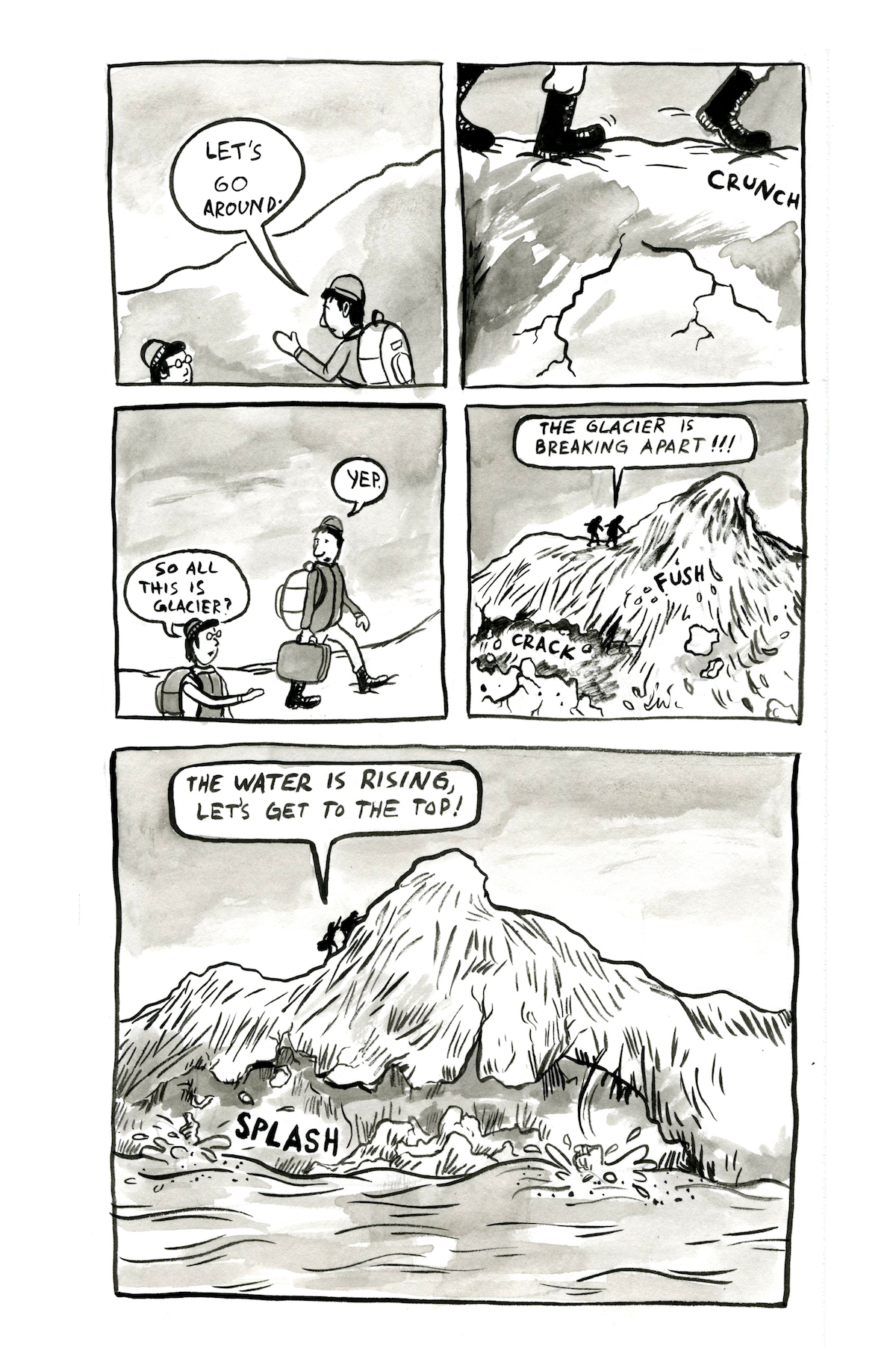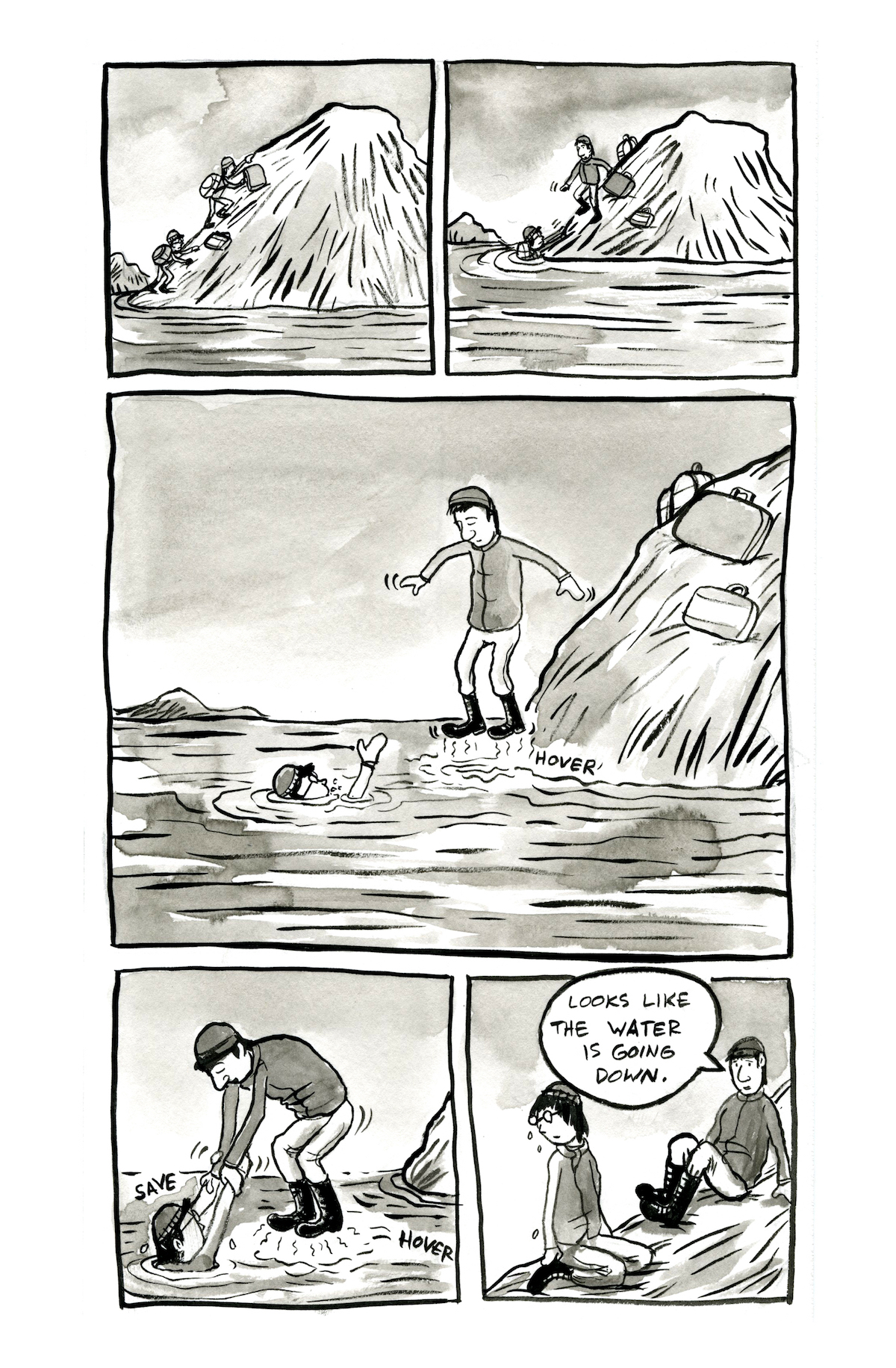Portrait Gallery: Tyehimba Jess
Each week, Christine Larsen creates a new portrait of an author for us. Have any favorites you’d love to see immortalized? Let us know
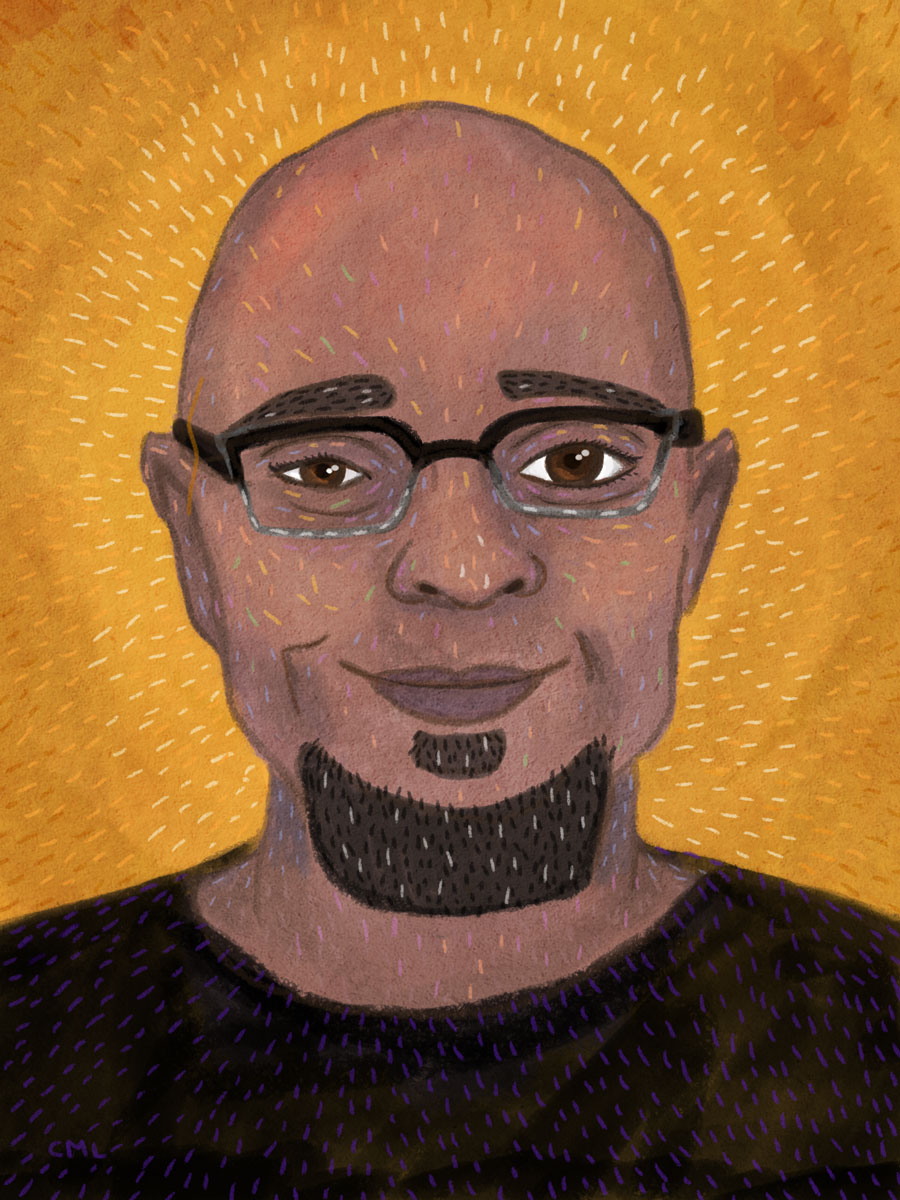
Sunday, March 4: Tyehimba Jess Olio Reading
This Sunday, Seattle Arts and Lectures is bringing Pulitzer Prize winning poet Jess to McCaw Hall. Jess is an artist who seems custom built for this moment in history. His poetry reflects the rich history of music of Black America - the blues, the gospel, the work songs, the jazz - and he’s rewriting the nation’s history to make more space for Black stories and songs.
*McCaw Hall, 321 Mercer St, http://lectures.org, 7:30 pm, $20.
Kissing Books: Don't fuck Nazis
Every month, Olivia Waite pulls back the covers, revealing the very best in new, and classic, romance. We're extending a hand to you. Won't you take it? And if you're still not sated, there's always the archives.
Romance’s greatest strength can also be its greatest weakness.
Romance’s purpose is to map in detail the intimate geography of the human heart. The genre invites us to peer deeply into a hero and/or heroine’s secret world — even when the characters are familiar types (the spunky ingenue, the troubled aristocrat) every romance heavily prioritizes the interiority of its protagonists, in all their messy, muddled glory.
This becomes a weakness when an author forgets to also think about their characters as participants in systems. About power, both personal and political. About money and status and violence and community.
The best romances, obviously, deal with both. Persuasion is a delicate second-chance romance about two people who feel things deeply but privately; it is also an extended meditation on the question of precisely how much weight we should give others’ opinions when steering the course of our lives. Alyssa Cole’s A Hope Divided shows us two brave souls sharing secrets in the attic of a single house; it also touches on Civil War politics, Stoic philosophy, interracial family dynamics, and the ethics of war and resistance.
But then there are the other romances. Stories where an author seems to let herself get too dazzled by the intimacy she’s building between her characters, to the point where she forgets about external systems of power and privilege — including her own — and goes off-track into a dense forest full of thorns and brambles and howling wolves.
This is where you get the Nazi heroes.
I mean, fuck, let’s be clear: this is the best-case scenario for why we see this particular shade of awful — the kind where the hero’s “not really one of them” even though he’s very highly placed within a brutal, fascist regime. Because the author somehow fails to appreciate the difference between a bad boy and a bad man. As with the infamous Nazi inspirational romance from two years ago — yeah, you heard me — this new book is a failure of empathy on a colossal level: redeeming its Nazi-turned-Stasi hero (WTF WTF WTF) requires you to gloss over violence inflicted on every other inhabitant of this fictional world. NOT TO MENTION real-life readers, for some of whom this experience is not fictional.
This hero’s HEA is only (barely) imaginable if you limit your gaze to one made-up couple and never, ever, ever look up.
I do not want to get sidetracked here. Nazi romances are definitely A Problem, but for the purposes of this column they are not The Only Problem. They are the most flagrant symptoms of a broader malady that’s frustrated me for some time. Blistering critique of a single bad book is vital, but so is trying to figure out why one specific type of bad book keeps showing up and crapping in our coffee.
It’s impossible not to see a kinship between the above books and many romances that less immediately advertise their terribleness: books where the heroes sexually assault the heroines (but is forgiven when he grovels later), books that gloss over domestic violence and abusive behavior (he just wants what’s best for her, and she doesn’t know what she wants really), books that attempt to grapple with racism by centering a white character’s feelings about it (ditto homophobia and transphobia), books where the hero’s a straight-up kidnapper or murderer and the text expects us to believe this is NBD because he just feels so bad about it later, you guys.
All these books have the same flaw: they expect us to focus completely on the inner feelings of the specific hero — it’s nearly always the hero who gets a license to be terrible — and ignore emotional or physical harm done to anyone else. It asks us to sympathize with the powerful because deep down, aren’t they the real victims?
Reviewer Jennifer Porter recently wrote an incisive thread about what she termed the Problematic Ever After — HEAs that she couldn’t believe in, for reasons varying from irredeemable jerkishness to a severe, sustained imbalance in the concluding relationship. She states that while she can’t believe in these books, she likes that they force her to think. Romance readership is full of supposedly frivolous comment threads about popular characters (like this one) that are actually lengthy and nuanced conversations about forgiveness, redemption, ethics, and trust. (Extremely Chidi voice.) We talk about consent (both enthusiastic and dubious), and realism, and hope, and regret, and have very complex, mostly respectful debates about rape fantasies and survivorship and tokenism and representation. All the time. You know, for fun.
And then another “edgy romance” comes along to claim it’s the hot fascists who most deserve empathy. Or slaveowners. Or stalkers. That this is somehow a daring and iconoclastic position, instead of the simple fetishization of power. And when many of us voice our horror at this amoral position, we’re told we’re stifling creativity or free expression. The truth is, romance’s warm empathic glow becomes a weaponized laser when it’s too narrowly focused. It’s an ethical error people keep choosing to make, and almost always for the amoral (white, straight, male, cis, able-bodied) hero’s benefit.
We believe in people, it seems — but we believe in some people more than others.
Am I saying you shouldn’t write romance with fascists as heroes? Yes I fucking am. What’s wrong with you?
But more importantly, I’m telling you — telling all us authors — to really stop and think about not just what you’re writing, but what you’re publishing. What are you spending time and thought and marketing money on? What is taking up real-world or digital shelf space?
Romance is never a neutral genre. When you designate someone as a hero or heroine in a romance, you are making an ethical claim. This is what distinguishes it from porn — yes, even those super-kinky erotic romances where every scene’s an endless orgasmfest have an ethical framework built in. Porn is about someone being turned on. Romance is about who people turn into.
What choices is your book asking us to support on its characters’ behalf?
Again, it’s about systems. Right now in this country we are seeing a surge in anti-Semitism and anti-Muslim rhetoric. We see white supremacy openly tied to the violent power of the state. Our neighbors are being deported, our children are being shot in appalling numbers, and our government hastens to cut medical coverage, especially for disabled Americans who depend on it the most. Flint still doesn’t have clean water, Puerto Rico doesn’t have electricity, and indigenous women are going missing and being murdered at frightening rates.
To look at all this, then to decide that now is the time your self-pubbed fascist hero could really drum up some buzz and rake in the royalties — this is a selfish, selfish choice at best. At worst, it’s outright malicious.
I’m not putting limits on art. Authors, write whatever messy morality you feel like — so long as you’re only poisoning your own sandbox. But when it comes time to publish it, promote it, and profit from something this questionable, you should expect a more rigorous critique.
It’s not about what you’re writing. It’s about what you’re taking money for. That’s what shows us whose side you’re really on.
Recent Romances:
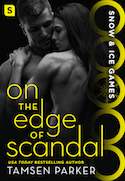
On the Edge of Scandal and Fire on the Ice by Tamsen Parker (Swerve, contemporary m/f and f/f):
Tamsen Parker has the canniest timing in all of romance, because just as social media was exploding about the Olympics—and especially the super-duper platonic friends who just kiss each other on the neck and curl passionately around one another to romantic anthems gold-medal magic of Tessa Virtue and Scott Moir—she released not one, but two books in her Snow and Ice Games series. On the Edge of Scandal features a hockey coach struggling with chronic pain and his star player struggling with a douchebag boyfriend. (One of these troubles is more easily eliminated than the other.) Coach/player romances aren’t everyone’s cup of tea (especially after the recent Nassar trial) and this book has to navigate carefully to make it through the minefield of squick. Like the mentor/mentee relationship in the previous Seduction on the Slopes (m/m, and hilarious), this is accomplished in no small part by what I’ve come to call Parker’s Chill Feminist Bro Hero Voice: Ash’s inner narration is self-deprecating, casually curse-filled, and humorous—a somewhat hapless but never heartless masculinity that values protectiveness over possessiveness. More than any other author, her heroes feel like dudes you could be friends with in real life. This one didn’t quite stick the landing, but it was still a solid read.
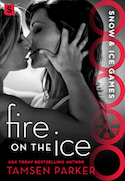
Fire on the Ice, on the other hand, is like taking a bite of what you thought was a caper and learning it’s a pepper, one of the absurdly hot monster kind, and it got where it was today by beating up all the lesser peppers until it absorbed all the capsaicin the entire pepper universe could produce. Which is to say: it’s flaming hot, and agonizing, and definitely an experience you want to talk about with others. Short-track speedskater Blaze Bellamy is a fire-haired, libidinous bruiser who lives to be in the spotlight. Figure skater Maisey Harper is known as the Canadian Ice Princess: cold and aloof and outwardly prim. Inwardly and in-bed-wardly she’s bossy and creative and strong and more than a match for the other woman. The two have hooked up before, so it’s not surprising that the sex is quick to get really, really filthy (in the best way)—but this is a romance, so even amazing sex isn’t what’s going to get us to the end. No, this is the story about two people getting their feelings all tangled up; it’s about fear and vulnerability and hope and betrayal. My only objection is that it felt like there were one or two scenes missing—say, a moment where Blaze overhears a voicemail from Maisey’s parents and confronts how emotionally cruel they’ve been to her, or a moment where Maisey meets someone, anyone else in Blaze’s life. (Blaze doesn’t appear to have friends on the page, which is an odd thing now I come to think of it.) Sometimes the end of a romance feels like less like a conclusion and more like the beginning of a new book, one which the characters are starting to write together. This is definitely one of those.
I’m not going to make her sorry for giving up control for a while. Never make someone sorry for something you’d like to do again.
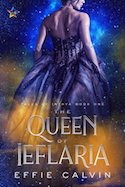
Queen of leflaria by Effie Calvin (NineStar Press: fantasy f/f):
I have a terrible weakness for a scoundrel with heart of gold, and most especially scoundrelly princesses in lesbian fantasy novels. This particular book gets off to a slow start (so many fantasy god names, and we only just got here!) but the pace picks up as soon as Crown Princess Adale of Ieflaria stomps grumpily onto the page with a hangover and grass stains on her silver gown. Adale is being pressured to marry Esofi, princess of Rhodia, who was betrothed to Adale’s older brother until the crown prince’s recent death. Esofi brings an entourage of battlemages to help with Ieflaria’s current dragon problem, and her arrival naturally stirs up long-simmering political tensions and conspiracies. Adale has nothing against Esofi (whose blonde, plump prettiness appeals to her) but believes herself completely incapable of being the kind of queen her country needs. Her late brother’s shadow looms large and brings on a torrent of endearing self-doubt.
Gentle, devout Esofi, meanwhile, may look like “a fat little rosebud,” but that’s only until she gets angry enough to send a bolt of raw magic through your face with her bare hands. Because she’s a badass dragonslayer. Who is very aware of her responsibilities to her adopted people, even though she yearns to be loved for who she is and not just how useful she can be.
Reader, I loved them both so much by the end.
The book admittedly is not without flaws—the prose is at times painfully direct, which makes it skew toward YA even though it’s marketed as adult—but what it does well is so rare and to be treasured that I have zero qualms recommending it. I almost put it aside in the early chapters, and I shudder at the near-miss, because by the halfway point I couldn’t put it down. Remember last month’s Old Skool story with dragons that I felt was almost something special? This new one is the real deal: a queer-femme-centric, trans-inclusive, lushly realized fantasy romance with nonbinary forms of aristocratic and military address, political intrigue, dragons, political intrigue among dragons, and manipulative gods. And a stupidly gorgeous cover. Do not miss this one.
“What about your parents?” asked Adale.
Esofi swallowed visibly. “My father is a good man,” she said at last. “Our people love him for his patience and understanding.”
“And your mother?”
“Oh, they love her too,” said Esofi in a brittle tone. “Everyone loves her.”
“I am sorry,” whispered Adale.

Dance with Me by Alexis Daria (SMP Swerve: contemporary m/f):
In the first book of this dynamic series we saw dance reality show judge Dimitri and star professional dancer Natasha (both secondary characters) hooking up, and arguing, and hooking up some more. We thought they were just dicking around. We thought it was only physical. But oh, my friends, we were wrong.
Dimitri’s crazy about Natasha. Has been from the moment they met. He’s tried to play things casual until he’s sure of how she feels, which is a dumb but classic move that usually leaves a hero looking arrogant and unfeeling. And Natasha? Has no idea how he feels. She wants Dimitri desperately—can’t stay away from him—but she imagines herself as alone and unloveable so thoroughly that it blinds her to any other possibility for her future.
The emotional suspense this generates is exquisite. This is the kind of romance where the characters’ yearning becomes an ache in the reader’s gut, where you occasionally have to put the book down to yell incoherent things at the wall because there are too many feelings to stay locked silently inside your body.
Both Dimitri and Natasha are driven, talented, ambitious, and hard-working. They’re both immigrants, and have parallel but not identical struggles around how they’ve dealt with that experience. Family, creativity, friendship, when to ask for help and when you need to stand up and get things done on your own—this book has a lot going on, but it never feels like too much. It has real-life complications and nuance but is never muddy: there’s no one easy answer to a serious problem, but there are a lot of ways to figure out new solutions and do a little bit better than you did before. This book believes hope is a process, a muscle you can develop with practice, and that’s something we all need at this moment in time.
I enjoyed the first book, but this one? I fell utterly in love. Head over heels. And doesn’t it lift your heart when an author’s second book is even better than their first? I can’t wait to see where this author goes next. I’m along for anything she’s got planned.
Hope. That was it. That was the thing fluttering in her chest like a bird trying to fight free from a cage.”
This Month’s Psychically Gifted Historical Heroine Finding Love and Solving Murders in a Cross-Genre Smorgasboard

Second Sight by Amanda Quick (Jove Books, historical paranormal m/f):
It can be hard, sometimes, for readers who like their genres all to happen at once. You can find mystery, and romance, and mystery romances (more commonly known as romantic suspense); you can find fantasy, and romance, and fantasy romances, and romances with fantasy elements (or paranormal romances—don’t get me started on the distinctions between these subgenres or we’ll be here all day). Less common is to find one book or series that blends all these elements together. Especially in a historical setting, which is my absolute favorite. So it’s no wonder I got hooked badly by Amanda Quick’s Arcane Society series, where psychically talented Victorians hunt killers and thieves and megalomaniacal alchemists through the gaslit alleys of London. These books can be a bit like Mercedes Lackey’s books—unsubtle wish fulfillment tales, where you can see all the gears at work while you read—but it’s so much fun watching everything come together that the lack of subtlety matters less than that ultimate reader question: What’s going to happen next?
Second Sight, the first book, is still my favorite of the series on account of the heroine, Venetia. She’s a professional photographer in an era when the process is new and the chemicals volatile so poisonings and explosions are common accidents. She can also see auras, which is one reason her photographs always appear to capture the essence of their subjects. She is hired by rich eccentric Gabriel Jones to photograph the art collection at his country manor—and while she’s there, she decides to let him seduce her because she’s attracted to him and has never had the chance to be seduced before. Turns out, sex is fun! But they don’t get to go for a second round because thieves begin attacking and Gabriel hustles Venetia out a secret passage to safety. Later, Venetia reads about Gabriel’s death that night, and mourns the loss of someone so intelligent, kind, and hot. (She could tell a lot of this from his aura, you see, even though they’d only just met.)
So she borrows his last name.
It’s a sound business decision: an unmarried young woman would have a much harder time setting up a photography studio than a widow, so Venetia Milton becomes Mrs. Venetia Jones, whose late, lamented husband died tragically and left her the money to start her business. Her photos become an instant fad among the aristocracy, who are eager to purchase portraits in this mysterious new medium.
And then Gabriel Jones shows up, very much alive, and very interested to know why Venetia is going about town posing as his widow. Also, the thieves who interrupted that first night are still out there, they’ve graduated to murder, and they have their sights set on Venetia.
This is where the book really starts to have fun. There are aristocrats whose external beauty does not mask the terrible sins in their aura. There are adorable scenes with Venetia’s matchmaking family, who decide Gabriel is Just The Thing She Needs. There are murders by shadowy figures in fog-laced streets, pursued by Gabriel’s psychic tracking gifts, and a fantastic scene where Venetia dons an impeccably tailored men’s suit and takes Gabriel to the drag kings’ club for a fun night out. It’s a book that throws in everything but the kitchen sink, but it stays anchored in the emotional connection between two strong, dazzling characters. Great for chill winter days, when it feels like the world will never be green again.
He was the man she had been waiting for, the lover who was destined to ruin her. But first she wanted to photograph him.
Citing decreasing retail book sales, rising rents, and other increased expenditures, Greenwood community bookshop Couth Buzzard Books launched a GoFundMe campaign this morning. The campaign aims to raise $9,500 dollars through the sale of a number of rewards, including locally produced art, music, and books. Additionally, funders who provide up to $100 in support will receive an equal amount in store credit to spend on books at the shop.
From the page:
We are confident in and excited about our future because of our broader, community focus. More importantly, we believe in the diverse communities who continue to keep The Buzzard flourishing: thank you for helping to create what makes Couth Buzzard so special to us and to others. For many, our store is a second home, and we want to keep our space open to all, our events no- or low-cost, for many more years to come. To achieve this, we are asking for your financial support in order to continue serving this community.
Give if you can. We'll be talking with Couth Buzzard owner Theo Dzielak in the coming days about the campaign and his plans for the Buzzard's future.
Thursday Comics Hangover: How to attend ECCC without attending ECCC
Emerald City Comicon has long since sold out, but that doesn't mean you can't enjoy a number of (free) comics-centered celebrations around Seattle this weekend. Here are a few of the best-looking events for you to attend:
Broadway's Phoenix Comics is hosting a signing tonight from 5 to 7 pm with Seattle author G. Willow Wilson and former Batgirl writer and MotorCrush writer/artist Babs Tarr.
The fantastic free comics anthology Thick as Thieves is hosting "Thievescon" Friday night at Nii Modo on Stone Way. All sorts of great local cartoonists will be in attendance including Marie Hausauer and Sarah Ramano Diehl. This looks to be a great independent Seattle-centric mini-con.
Also on Friday night, Outsider Comics and Geek Boutique in Fremont is hosting Seattle artist Tatiana Gill as part of their artwalk celebration.
Saturday afternoon and evening, Outsider Comics is hosting a signing from cartoonist Ben Fleuter and a signing from Richard Rivera, who created something called Stabbity Bunny.
Yesterday I interviewed Jaime Hernandez, who will be doing a special signing at a party at the Fantagraphics Bookstore and Gallery in Georgetown on Saturday night with other cartoonists including Simon Hanselmann.
And also on Saturday night, Phoenix Comics is hosting a party to celebrate the podcast Jay + Miles X-Plain the X-Men.
And if you'd rather buy comics than socialize, Comics Dungeon in Wallingford is hosting a different sale for every day of the convention. These sales, according to the Dungeon, have "one specific goal; to try to get you to try something new!"
The Seattle Times publishes a report on the allegations against Sherman Alexie
Tonight, Nina Shapiro and Brendan Kiley at the Seattle Times published the most comprehensive coverage of the accusations swirling around Seattle author Sherman Alexie to date, including a statement from Alexie.
Over the last few weeks, a number of literary figures have leveled unsettling charges against Seattle author Sherman Alexie on social media. Seattle author Litsa Dremousis has tweeted that "Dozens of women" have approached her with stories of Alexie "sexually harassing them, making unwanted advances, cornering them in rooms, &/or explicitly threatening to end their literary careers if they told anyone."
Dremousis and other writers have claimed that reporters from nearly a dozen news organizations including the Guardian, NPR, and the New York Times are actively working on this story. Publishers Weekly author John Maher, who published a good piece on the story surrounding the accusations today, tweeted that he's been working on the story "since October" but that "No one will go on record-they are terrified of potential consequences."
In his statement, Alexie says that he has "done things that have harmed other people, including those I love most deeply. To those whom I have hurt, I genuinely apologize. I am so sorry." Then he pivots to a repudiation of "the accusations, insinuations, and outright falsehoods" allegedly made by Dremousis, citing her failure to disclose an affair with Alexie.
Dremousis has confirmed that relationship to the Times, but refutes its influence on her claims. She points out that…
…she and NPR have been working together to interview women on the record. "We've recorded five or six already," she said. "Once the NPR story is out, it nullifies everything."
The SRoB has published Alexie and sponsored events with him. We're horrified by these allegations and take them very, very seriously. The best way we can contribute to the discussion in this moment is by not adding to the deluge of commentary until we have more information. Right now, excellent journalists are hard at work distinguishing the signal from the noise; we want to let them do their jobs with as little distraction as possible.
If you have any information about this story, we recommend you contact Shapiro and Kiley at the Times: nshapiro@seattletimes.com and bkiley@seattletimes.com, or 206-464-2507. We'll continue to monitor the story and share what we know in the coming days.
Book News Roundup: Did you need another reason to love Dolly Parton?
Emerald City Comicon is coming this weekend! The fantastic Sarah Anne Lloyd at Curbed compiled a handy list of Seattle-area comics shops to visit over the weekend. I have to admit, I had never heard of Burien's Ancient Comics until I read this list and now I can't wait to check it out.
The Seattle Public Library's Shelf Talk Blog is celebrating ECCC with a list of worldbuilding comics, including Faith Erin Hicks's excellent Nameless City series.
Applications close tomorrow for Clarion West's summer workshops. If you're an aspiring sci-fi writer, you should get involved with Clarion West; they're an amazing resource.
Ta-Nehisi Coates is writing a Captain America series. The first issue will be published on July 4th.
Fantasy author Terry Goodkind became an internet villain this week when he encouraged his fans to mock his most recent book cover, which was illustrated by Bastien Lecouffe Deharme. I've literally never heard of an author shitting on his own book cover in public. Goodkind is known as an Ayn Rand acolyte; it's not too surprising that he has no idea how to act like a decent human being.
But let's not dwell on the horrible people in the world. Let's celebrate the truly great human beings out there, like Dolly Parton. Why am I talking about Dolly Parton on a book site? Because of this story from the Washington Post: Parton just donated her hundred millionth book. Yes, her 100,000,000th book.
Parton is the founder of Imagination Library, a nonprofit that started out donating books in Sevier County, Tenn., and grew into a million-book-a-month operation. Families who sign up receive a book per month from birth to kindergarten. The singer donated her organization’s 100 millionth book to the nation’s library on Tuesday.
"Let us be part of the change"
Published February 28, 2018, at 12:00pm
On the anniversary month of the ouster of Ferdinand Marcos, Donna Miscolta traces the stories of ten siblings caught in the crucible of revolution.
For Jaime Hernandez, Love and Rockets is everything
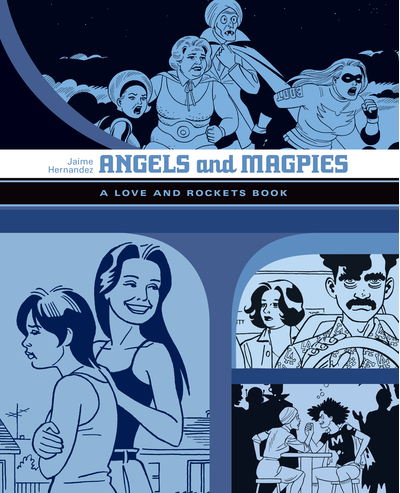
Love and Rockets co-creator Jaime Hernandez is a guest at Emerald City Comic Con this weekend, but he can't visit Seattle without a visit to his lifelong publisher, Fantagraphics Books. This Saturday at 7 pm, Hernandez will be signing books and talking with fans at a free event in the Fantagraphics Bookstore and Gallery in Georgetown to celebrate the release of a deluxe artist edition portfolio highlighting his creative process as a cartoonist.
Hernandez's latest Love and Rockets collection, Angels and Magpies, continues the story of the popular characters he's been writing and drawing since 1981, but it also brings something new to the equation. Hernandez spends an extended sequence in the book on a superhero adventure with all the trappings - spandex, capes, fistfights, creepy demons, powers, the works.
"The superhero story came about because we had changed formats," Hernandez tells me over the phone. "We changed the size of [Love and Rockets] and I needed to fill 50 pages in a year. I had never done it all at once, before," he said. The superhero comic was originally intended to be "just a side project," he says, but he worked it into the larger Love and Rockets story.
Hernandez's enthusiasm for the story is apparent on every single page of the book. "It kind of wrote itself," Hernandez says. "I was having a lot of fun. I guess you could say it was kind of a new approach."
When I ask if Gary Groth - Fantagraphics Books' publisher and an avowed hater of mainstream superhero comics - would have published these superhero strips back in the 1990s, when Groth was most avidly raging against the machine, Hernandez laughs. "I think he would, yeah," he says. Groth, Hernandez says, has always given Hernandez and his brother Gilbert a wide berth in their Love and Rockets work. Groth "doesn't step on our toes that way. If we do something a little oddball and he doesn't like it, I just don't hear from him for a couple years."
Is Hernandez content to keep working on Love and Rockets comics? I bring up Peter Bagge, a contemporary of the Hernandez brothers who has found a successful and surprising second act as a biographer of important women in history. Does Hernandez have any books that he'd like to work on outside of the world he's created?
"I prefer to stay in my little universe and help the characters grow old," he tells me. "If there's anything I want to tackle, it usually will fit in there. I'm getting older, you know, and I just want to see what happens with my characters. And so I concentrate on them as real people and try to figure out, 'okay, what are you going to be at 60?'"
Hernandez says he's fully committed to his characters, but he still experiences a lot of doubt as an artist. "Every issue I draw, I have to have a hate period in there where I can't get through it. I have to argue with myself: 'is this worth it? Is this worth everyone's time? Is this worth my time? Is this good art?' And part of me is going, 'no it ain't, old man.'"
In the end, Hernandez says, "I come to this compromise with the five people in my head and then I say, 'okay, it's good enough - or good enough for now."
"Next time I'll get it right," he says.
Feel free to soak up Zadie Smith's brilliance
Let's open with a word of praise, first, for the Seattle Public Library's Peak Picks program, which places copies of popular titles in neighborhood library branches on a first-come, first-serve basis. It's the perfect antidote to those long lists of holds that vex library users who want to read the hottest, newest titles on their release. The program encourages readers to visit their local library often, and it encourages high circulation numbers, and it gets hot new books into more hands.
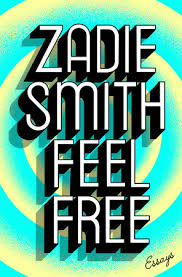
Over the weekend, I bumbled across a Peak Picks edition of Feel Free, Zadie Smith's newest book of essays, in a small SPL branch. Smith is one of those rare authors who is so well-regarded that her publisher doesn't bother to send review copies to any but the most elite outlets, and so Feel Free hadn't yet crossed my desk. I checked out the book, and basically inhaled it in a day.
Smith is one of the finest novelists of her generation, but her essays are underappreciated. This happens to the highest-profile literary authors on a regular basis, for some reason. It took almost a generation, for example, before David Foster Wallace's essays were acknowledged as their own body of work - one as valuable or even more valuable than his fiction.
If you were to read only one of Smith's essays in this book, I'd direct you to "Generation Why?," her contemplation of Facebook, David Fincher's film The Social Network, the books of futurist Jaron Lanier, and much more. Smith's regard for Mark Zuckerberg feels genuine, and so does her terror at his clear-eyed contempt for humanity. "You want to be optimistic about your own generation," Smith writes, but there's also a special brand of loathing that you reserve for your own peer group. "Generation Why?" pivots between optimism and loathing so deftly that you might not feel the sway and churn of Smith's writing until you pass over it a second or third time.
Even the minor pieces in Feel Free are major. A glossy profile of Jay-Z, for instance, is still as full of brilliant observation as any Alice Munro story. And the pieces on Brexit that open the book feel as immediate as anything printed in this morning's newspaper.
Look, you don't need me to tell you to read the new Zadie Smith book. A review would be unnecessary - like slapping an Instagram filter on a photograph of the Lincoln Memorial. Anything I can write about Smith's writing feels useless - additive for the sake of being additive. But you should know that this book is out there waiting for you to pick it up. One of our finest literary minds has some new thoughts for you to read, and read it you should. It's as easy as dropping by your neighborhood library.
Show the backlist some love!
Published February 27, 2018, at 12:00pm
Debbie Reese, of American Indians in Children's Literature, writes for us about how awards and best-of lists privilege the new -- at a high cost to books that represent diversity for kids from diverse backgrounds.
How to Use Safety Pin to Punch Richard Spencer in Four Steps
Step 1. Show up on Inauguration Night
Leave your pretensions at home this time,
you will not be saving anyone here.
There is a surge of black-clad bodies that will quickly take your stubborn
Berniecrat and I’m With Her shirts out of fashion.
You have a bleeding heart
pinned to your sleeve by a safety pinHuffington Post told you to wear it
Your well-meaning aunt told you,
with the force of a whole rich neighborhood association’s facebook group behind her, that this
tiny piece of metal
will save the poor and wretched
welcome them to your teeming shore —No.
Don’t get caught up in pretensions.Step 2. When you see notorious white supremacist Richard Spencer being interviewed by the news,
make sure your safety pin is visible.
Wait for a poor, victimized Person of Color to approach you for help.
You’ll grow so tired
of waiting for an opportunity to show off your allyship you might learn something.Step 3. Here is the hard part
While Richard Spencer is talking about the Pepe the Frog pin on his lapel
his face
will be interviewed by a fist instead.
He, all bigotry, hair gel, and bloated pride
stumbles from the well-placed blow, lands on the concrete a couple yards awaySuddenly, the assailant’s fist is Lady Liberty’s torch, blazing a trail for us to march on.
Suddenly
we are all the fist
humiliating white supremacy at its own inauguration.In the universe of this small victory,
no one is president.
No cop tear gasses a restaurant without resistance
and bigotry
bleeds from biting its own eager tongue again.
Someone punches Richard Spencer and hope blooms a tangible thing in me.
Hundreds of miles away
I breathe just a little easier>so before you yell,
“just sign a change.org petition!”Think of how long we have been waiting.
How you say,
“we’ll survive these four years”
as if we
have not been trying to survive for centuries.Think of you love watching us swallow when we want to spit.
Pressure hosing a panther and reprimanding her when she bites.Think of how you pulled the nine inch knife out six inches, stared at the wound, and called the bleeding progress.
Think of where you were
when an islamophobe tore off her hijab on the bus,
and you did not do anything.
Think of the community centers that shook with death threats
and you
did not do anything
Think of the cops that gunned a black kid
into memory and you
did not
do
anything.Step 4.
I will not come to you for help.
Take off the safety pin.
Know that fascism does not arrive with a name tag,it arrives as your friend.
It arrives as Richard Spencer, well-manicured and well-behaved, speaking poison into cameras spinning it acceptable.Do not allow this by any means necessary
Leave your pretensions at home.
Practice
making
a fist.
Mail Call for February 26, 2018
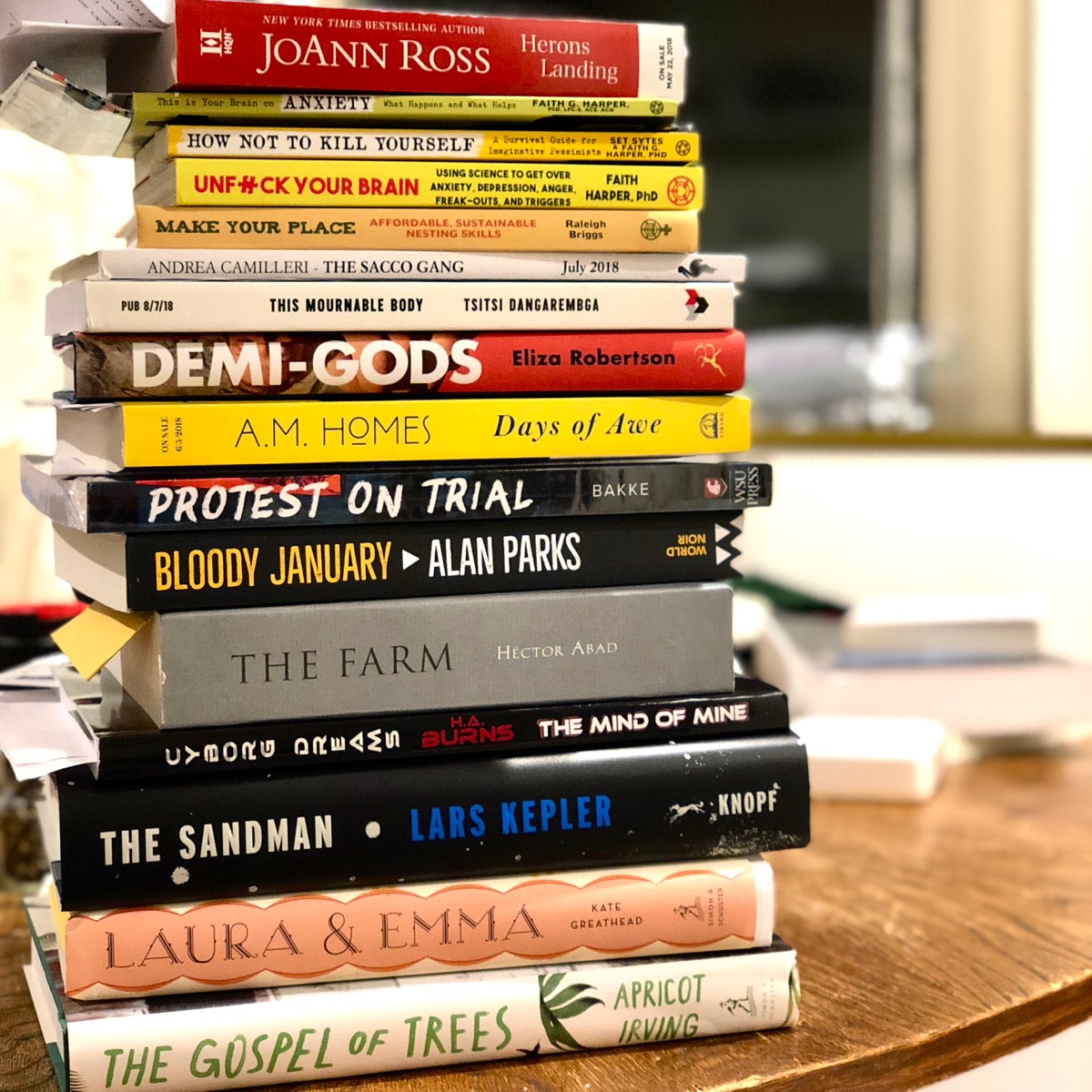
The Seattle Review of Books is currently accepting pitches for reviews. We’d love to hear from you — maybe on one of the books shown here, or another book you’re passionate about. Wondering what and how? Here’s what we’re looking for and how to pitch us.
The sharpest ear in Hollywood
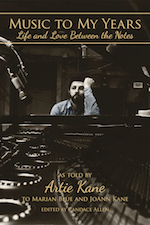
Amphora Editions, a small publisher with a penchant for the odd and beautiful, is sponsoring us this week to give you an inside look at Kane's new memoir, Music to My Years: a candid and wryly witty account of his life and adventures in entertainment. The sample chapter on our sponsorship page includes cameos by Jascha Heifetz, and Lionel Newman, among others. Stop by and spend a few minutes in 70s-era Hollywood with one of Hollywood's great working musicians.
Sponsors like Amphora Editions make the Seattle Review of Books possible. Did you know you could sponsor us, as well? If you have a book, event, or opportunity you’d like to get in front of our readers, reserve your dates now.
Your Week in Readings: The best literary events from February 26th - March 4th
Monday, February 26: Family Story Time
I don’t know what could possibly be cuter than families wearing pajamas and bringing their favorite stuffed animals to a storytime in the Queen Anne Library. Maybe if they had pet bunnies at the event, too. But that might be overkill, right? Seattle Public Library, Queen Anne Branch, 400 W Garfield St, http://spl.org, 6:30 pm, free.Tuesday, February 27: Winter Sisters Launch Party
Bestselling Seattle author Robin Oliveira debuts her new novel, Winter Sisters with a book talk, reading, Q&A, prize drawing and maybe some wine. The book is about two girls who disappear from Albany (circa 1879) after an intense blizzard that shuts the city down. Elliott Bay Book Company, 1521 10th Ave, 624-6600, http://elliottbaybook.com, 7 pm, free.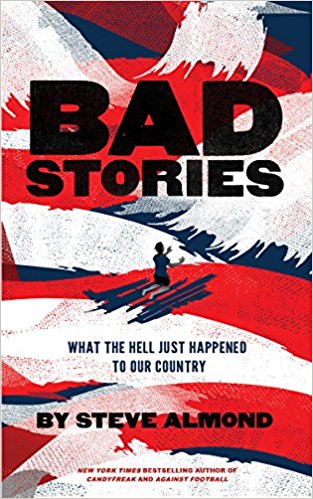
Wednesday, February 28: Bad Stories Reading
Beloved writer Steve Almond brings his latest book, Bad Stories: Toward a Unified Theory of How It All Came Apart, to town. It’s a collection of essays all written after Donald Trump was elected president. Almond will be in conversation with Seattle novelist Peter Mountford about how we got here and where we’re going.Sorrento Hotel, 900 Madison St., 622-6400, http://hotelsorrento.com, 7 pm, free, 21+.
Thursday, March 1: Katz Distinguished Lecture
The Katz Distinguished Lecture in the Humanities is a regular event at UW that celebrates art and artists. Tonight’s lecturer is Professor and Chair of English at the University of Washington, Brian Reed. Reed will talk about the long and fruitful relationship between poets and birds. Kane Hall 210, 4069 Spokane Lane, http://simpsoncenter.org/reed, 7 pm, free.Friday, March 2: Emerald City Comicon
This event has long since sold out, but if you haven’t gotten an ECCC ticket, you should still hang out downtown and take in the costumes and the exuberance. Short Run is still my preferred comics convention, but ECCC is a beautiful monster. There are also plenty of free satellite events happening, including a signing by Love and Rockets cartoonist Jaime Hernandez at the Fantagraphics Bookstore in Georgetown on Saturday, March 3rd at 7 pm. Washington State Convention Center, 800 Convention PlaceSaturday, March 3: Free Tax Help
Did you know the Seattle Public Library offers free help with your taxes? Today, you can find helpers at the Central Library downtown from 11 to 5 pm. But they’re also bringing tax help to a SPL branch near you between now and April. Check their site for more details — especially if you’re a writer who has done a lot of freelance work. Seattle Public Library, 1000 4th Ave., 386-4636, http://spl.org,11 am, free.
Sunday, March 4: Olio Reading
See our Event of the Week column for more details.*McCaw Hall, 321 Mercer St, http://lectures.org, 7:30 pm, $20.
Literary Event of the Week: Tyehimba Jess at McCaw Hall
Last year, when his collection Olio won the Pulitzer Prize, Tyehimba Jess became one of the best-known living poets in America. Jess has been celebrated in poetry circles for years, of course - leadbelly, a previous collection, won awards in 2004 - but Olio, published by Seattle publisher Wave Books, became an instantaneous must-have collection. Ironically, the fact that Wave was overwhelmed by the demand for Olio might have helped the book's success: it made Olio a must-have book, an object of desire that lasted much longer than the Pulitzer's glow might have lasted.
Jess is an artist who seems custom built for this moment in history. His poetry reflects the rich history of music of Black America - the blues, the gospel, the work songs, the jazz - and he's rewriting the nation's history to make more space for Black stories and songs.
It's often complicated when a Black writer achieves success in white circles. Ta-Nehisi Coates famously rejected calls to assuage white guilt, or to provide cute answers, or to become the next James Baldwin. And Jess's poems - which examine the idea of minstrelsy, and other ways in which Black songs can become harmful entertainment for white America - have been wrestling with this success from the very beginning.
This Sunday, Seattle Arts and Lectures is bringing Jess to McCaw Hall. Almost a full year after his Pulitzer win, it seems very likely that Jess will have something new to say about success, and about the fickle spotlight of fame in 2018 America. The only thing we know for sure is that Jess won't say exactly what white audiences will want him to say. Instead, he'll say what they need to hear.
*McCaw Hall, 321 Mercer St, http://lectures.org, 7:30 pm, $20.
The Sunday Post for February 25, 2018
Each week, the Sunday Post highlights a few articles we enjoyed this week, good for consumption over a cup of coffee (or tea, if that's your pleasure). Settle in for a while; we saved you a seat. You can also look through the archives.
I thought my bully deserved an awful life
Geraldine DeRuiter, the blindingly smart author and blogger, did an online search for her childhood bully, hoping for the usual comeuppance story. Instead she found her tormentor had died — young, scared, and alone. The essay she drew from that experience isn’t an apologia for bullies, who can do a hell of a lot of damage, but it’s a reminder that the forces that turn kids into bullies can be ugly. Does hating your bully turn you into a bully? Ugh. Thanks for the wake-up call.
I read that he had anticipated an attack. His friends said he was so terrified in the weeks leading up to his murder that he’d slept with a hammer under his pillow. I was haunted by what I imagined his final moments were like, by how scared he must have been. I cried for the boy who had made me so miserable.
Now I had to wonder: What kind of fate would I have considered sufficient retribution? Would I have been satisfied if he was merely unsuccessful or unhappy? What sentence are we comfortable bestowing upon a fifth-grader for his crimes? What’s the statute of limitations for revenge?
When Whisper Networks Let Us Down
A very long read but a worthwhile one by Sarah Jeong, who reported on the rape and abuse allegations against Morgan Marquis-Boire for The Verge. Here, Jeong talks about why whisper networks have failed to protect women against men like Marquis-Boire, men who exhibit clearly violent behavior but do so under cover of social status and of a host of other caveats and codicils. Given an excuse to excuse men for hurting women, we have; it’s time, Jeong says (and our social chorus will continue to say, I hope), for that to change.
The stories carried by whisper networks are easily subverted, especially when the accused has enough social capital. Journalist Anne Helen Petersen connects the concept of whisper networks to the function that celebrity tabloids and gossip magazines often play in the entertainment industry, and to how gossip and whispers of any kind are socially stigmatized as a feminine vice. She describes how “pun, innuendo, and blind items” in celebrity tabloids had long pointed to the truth about Weinstein and his normalized “casting couch,” hiding alleged nonconsensual assaults behind consensual encounters both real and imagined. But the same tabloid press went all out to smear Ambra Battilana Gutierrez when she wore a police wire to record Weinstein’s admission that he had groped her. “Harvey Weinstein rapes women” could also be heard as “Harvey Weinstein sure gets in a lot of trouble with crazy sluts.” The signals inside the whisper network can become corrupted, and sometimes, the connections fail because the carriers choose to protect the accused.
How Black Panther Asks Us to Examine Who We Are To One Another
SPOILER ALERT: save this for later if you haven’t seen Black Panther and care about spoilers. I have not yet seen Black Panther and usually do care about spoilers, but I read anyway. There was no way I was passing up an essay by friend-of-Seattle Review of Books Rahawa Haile.
Haile articulates a deep joy in the movie side by side with equally sharp criticism; she takes this movie seriously in a way that no other superhero film (no, not even Wonder Woman) has earned. And I’m happy to have read this before seeing Black Panther — happy that my first experience of it will be through her lens. There aren’t many reviews about which I’d say the same.
How then does one criticize what is unquestionably the best Marvel movie to date by every conceivable metric known to film criticism? How best to explain that Black Panther can be a celebration of blackness, yes; a silencing of whiteness, yes; a meshing of African cultures and signifiers — all this! — while also feeling like an exercise in sustained forgetting? That the convenience of having a fake country within a real continent is the way we can take inspiration from the latter without dwelling on its losses, or the causes of them. Black Panther is an American film through and through, one heavily invested in white America’s political absence from its African narrative.
Besides I'll Be Dead
Just a reminder that while our attention is diverted by the daily Twitter Trumpfeed, the oceans are rising steadily and will soon kill us all. Meehan Crist on why we’re so comfortable ignoring this uncomfortable reality.
How do you mourn the loss of someone whose hand you can still hold? How do you mourn a home increasingly prone to flooding, but not submerged, yet? The parallels aren’t perfect, but even the disjunctures reveal how wickedly hard the problem of climate grief can be. When a beloved person is slowly disappearing into the fog of senescence, the endpoint is known. With rising seas, the endpoint remains unknown. Three feet? Eight feet? Grief is stalled by uncertainty. For what eventuality should you and your community prepare? Of what do you need to let go in order to move forward? The incentive to wait and see is powerful.
Worst Roommate Ever
William Brennan investigates the first nightmarish, then tragic, story of Jamison Bachman, a serial squatter who posed as the perfect roommate then used escalating legal and physical threats to take over his hosts’ homes. A law education makes him a formidable annoyance in court; his presence on the grounds gives him destructive access to everything from bathmats to beloved pets (in one case, he started dropping his landlord’s cats off at local kill shelters). A broken man who did a lot of damage — and most, in the end, to his family and himself.
Bachman wasn’t a typical squatter in that he did not appear especially interested in strong-arming his way to free rent (although he often granted himself that privilege); instead, he seemed to relish the anguish of those who had taken him in without realizing that they would soon be pulled into a terrifying battle for their home. Nothing they did could satisfy or appease him, because the objective was not material gain but, seemingly, the sadistic pleasure of watching them squirm as he displaced them.
Whatcha Reading, Paige Embry?
Every week we ask an interesting figure what they're digging into. Have ideas who we should reach out to? Let it fly: info@seattlereviewofbooks.com. Want to read more? Check out the archives.
Paige Embry is the Seattle-based author of the new book Our Native Bees: North Ameria's Endangered Pollinators and the Fight To Save Them. She'll be appearing next Friday, March 2nd, at The Elliott Bay Book Company to talk about bees, her book, and her journey from geologist, to gardener, to bee expert.
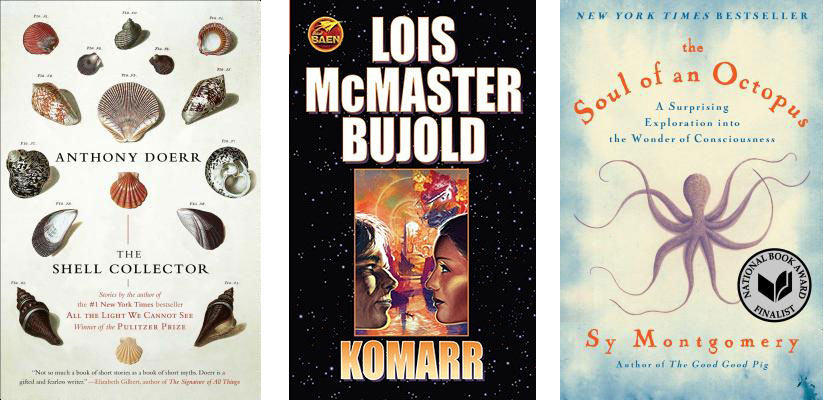
What are you reading now?
I’m reading Anthony Doerr’s collection of short stories, The Shell Collector. I’ve only just begun but find myself entranced by the title story, sucked in by the lure of the unfamiliar: the location in East Africa, the idea of being a blind shell collector and most of all, the exotic shells themselves and the creatures that inhabit them. As a writer, I read some of Doerr’s descriptions with awe and a little envy. On one page I find “a crab-guarded socket in the coral” and “a tiny tessellated cone.” Tessellated — what a delightful word. It is perfectly descriptive, has a pleasing sound and is also a little bit exotic—not a word commonly used in every day conversation. In short, I’m finding the first story in this collection a pleasure on many levels and I’m looking forward to seeing how the other stories compare.
What did you read last?
I like to re-read books, and when I’m under the weather I almost always pull out some old faithful. The books I choose in this situation aren’t mentally challenging, not even on the first read. What they all have is a character, or a group of characters, that I like and a world that is a respite to sink into.
The book that I turned to for this latest bout of illness was Komarr, part of a sci-fi series written by Lois McMaster Bujold. Komarr is toward the end of a series of about ten books based on a male character, Miles Vorkosigan. In the first book he’s 17 or 18 and in the last book I read he’s pushing 40. He lives in a world where humans have spread from Earth to inhabit many planets but there are no other sentient beings. The ethos of the planets varies. One, for example, is uber-liberal — a kind of Scandinavia on steroids. Miles’s planet is authoritarian, militaristic and unforgiving of mutations. Miles is smart and the son of a powerful man but he was damaged in utero and so is only 4’9”. He’s got a chip on his shoulder and over the course of the series you get to watch him grow up and deal with his reality. The stories are enjoyable, some of the side characters are well-developed and I like Miles. He and his world are a comforting place to go visit when I’m feeling ill.
What are you reading next?
For Christmas I bought my husband The Soul of the Octopus: A Surprising Exploration into the Wonder of Consciousness by Sy Montgomery. I usually try and buy him a book (or books) that seem just perfect for him. I confess that I bought this one knowing he’d likely enjoy it but if he didn’t—oh well, I certainly wanted to read it. Learning about octopuses (apparently it is octopuses and not octopi because octopus is derived from Greek, and you don’t plunk Latin endings onto Greek-derived words) would be a good enough reason for me to take a look at this book but I’m also interested to see the author’s approach to the subject since she didn’t start out as an octopus expert. She developed an interest and then threw herself into research — I can relate to that — and I’m looking forward to seeing how she handles it.
February's Post-it note art from Instagram
Over on our Instagram page, we’re posting a weekly installation from Clare Johnson’s Post-it Note Project, a long running daily project. Here’s her wrap-up and statement from February's posts.
February's theme: Song Lyrics
I have no problem with the weather or the dark this time of year — Seattle's coldest cold is nothing compared to other places, plants start changing early, and in February I always feel the air softening in this strange way. But I find myself bracing for terrible things to happen. In my teenage years, it was just being dumped, ordinary heartbreaks. As I got a little older, February turned into the time when I lost people for real — lots of deaths, also my divorce, which ended a whole life I'd had in another country. The first death was a close friend who died suddenly our junior year of college. She was the first friend I made there, and we bonded over music-hosted a weekly radio show together, one of the most perfect things in my life. The last time I saw her we were burning dozens of CDs for each other before leaving for study abroad; I listened to them obsessively on my own in London. Every year I think I about all the albums that have come out since she died, bands we loved breaking up and reuniting and making brilliant things she'll never hear. It's been 15 years, and I'm not really friends anymore with anyone who knew her; it's hard to find ways to memorialize her right. So this month I chose post-its that quote song lyrics-from Confusion The Waitress by Underworld (all the nights up late listening by myself); We Used To Be Friends by the Dandy Warhols (teenage me at Bumbershoot; grown-up me watching Veronica Mars episodes after my divorce); Two-Headed Boy by Neutral Milk Hotel (but I got the lyric wrong somehow); and Give Up The Ghost by Radiohead (like they folded all my Februaries into a single, perfect song). Two of these she never got to hear.
The Help Desk: $15 Reasons Why
Every Friday, Cienna Madrid offers solutions to life’s most vexing literary problems. Do you need a book recommendation to send your worst cousin on her birthday? Is it okay to read erotica on public transit? Cienna can help. Send your questions to advice@seattlereviewofbooks.com.
Dear Cienna,
The manager at a local bookstore complained to me about Seattle’s $15 minimum wage. He said it was impossible to run a business with a wage that high. He did make one good point: restaurants and most retail stores can raise the prices of goods they sell to pay for a higher wage, but books tend to have the prices printed right on them. On the other hand, I think everyone should have the right to a living wage: especially bookstore employees. I pretty much didn’t say anything. Should I have been more forceful? Should I argue the point again?
Patty, [Neighborhood Withheld by Request]
Dear Patty,
In the age of Trump, I don't believe it's worthwhile or effective to be forceful in disagreements. What is worthwhile is being reasonable, which is a perversion of my nature. Yet sometimes I try.
For instance, if someone pointed out that "books tend to have prices printed right on them," I might respond with, "that's what stickers were invented for." Or if someone complained that it was "impossible to run a business with a wage that high," I might inquire what they thought their own time was worth – less than $15 an hour in the sixth most expensive city in the nation?
And then, before I went back to that bookstore, I would consult my human friend Silly P – who is a big-brained intellect, voracious reader, and somewhat of an expert on Seattle's $15 minimum wage – and ask him what other helpful talking points I could throw at this misguided bookstore manager in lieu of discretely lighting his body hair on fire.
Since you may not have a Silly P in your life, I took the liberty of consulting mine for you. Here is what he added:
The minimum-wage law was designed and instituted in such a way as to give small business an advantage over the corporate chains – the wage increases at a slower rate for independent businesses with less than five hundred employees.
That delay is important for a few reasons. One: it allows businesses a lot of time to plan for the increases. Two: it provides time for the increased spending power of a lot of Seattleites who were previously making 8 or 9 bucks an hour to take hold. Workers in Seattle have more money to spend, now that the wage has increased. I know personally that a few local bookstores had their most profitable Christmases ever last year, and I bet much of that spending can be attributed directly to the waiters and dishwashers and retail workers who had more money to spend.
That said, both Silly P and I agree with you – Seattle has a lot of creative, thriving bookstores, and those bookstores wouldn't exist without booksellers. Those booksellers deserve a living wage; they deserve to be able to afford to live in their city.
Kisses,
Cienna

